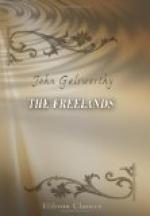Not wonderful that into the veins of those who nursed it, tending, watching its perpetual fertility, should be distilled a love so deep and subtle that they could not bear to leave it, to abandon its hills, and greenness, and bird-songs, and all the impress of their forefathers throughout the ages.
Like so many of his fellows—cultured moderns, alien to the larger forms of patriotism, that rich liquor brewed of maps and figures, commercial profit, and high-cockalorum, which served so perfectly to swell smaller heads—Felix had a love of his native land resembling love for a woman, a kind of sensuous chivalry, a passion based on her charm, on her tranquillity, on the power she had to draw him into her embrace, to make him feel that he had come from her, from her alone, and into her alone was going back. And this green parcel of his native land, from which the half of his blood came, and that the dearest half, had a potency over his spirit that he might well be ashamed of in days when the true Briton was a town-bred creature with a foot of fancy in all four corners of the globe. There was ever to him a special flavor about the elm-girt fields, the flowery coppices, of this country of the old Moretons, a special fascination in its full, white-clouded skies, its grass-edged roads, its pied and creamy cattle, and the blue-green loom of the Malvern hills. If God walked anywhere for him, it was surely here. Sentiment! Without sentiment, without that love, each for his own corner, ‘the Land’ was lost indeed! Not if all Becket blew trumpets till kingdom came, would ‘the Land’ be reformed, if they lost sight of that! To fortify men in love for their motherland, to see that insecurity, grinding poverty, interference, petty tyranny, could no longer undermine that love—this was to be, surely must be, done! Monotony? Was that cry true? What work now performed by humble men was less monotonous than work on the land? What work was even a tenth part so varied? Never quite the same from day to day: Now weeding, now hay, now roots, now hedging; now corn, with sowing, reaping, threshing, stacking, thatching; the care of beasts, and their companionship; sheep-dipping, shearing, wood-gathering, apple-picking, cider-making; fashioning and tarring gates; whitewashing walls; carting; trenching—never, never two days quite the same! Monotony! The poor devils in factories, in shops, in mines; poor devils driving ’busses, punching tickets, cleaning roads; baking; cooking; sewing; typing! Stokers; machine-tenders; brick-layers; dockers; clerks! Ah! that great




